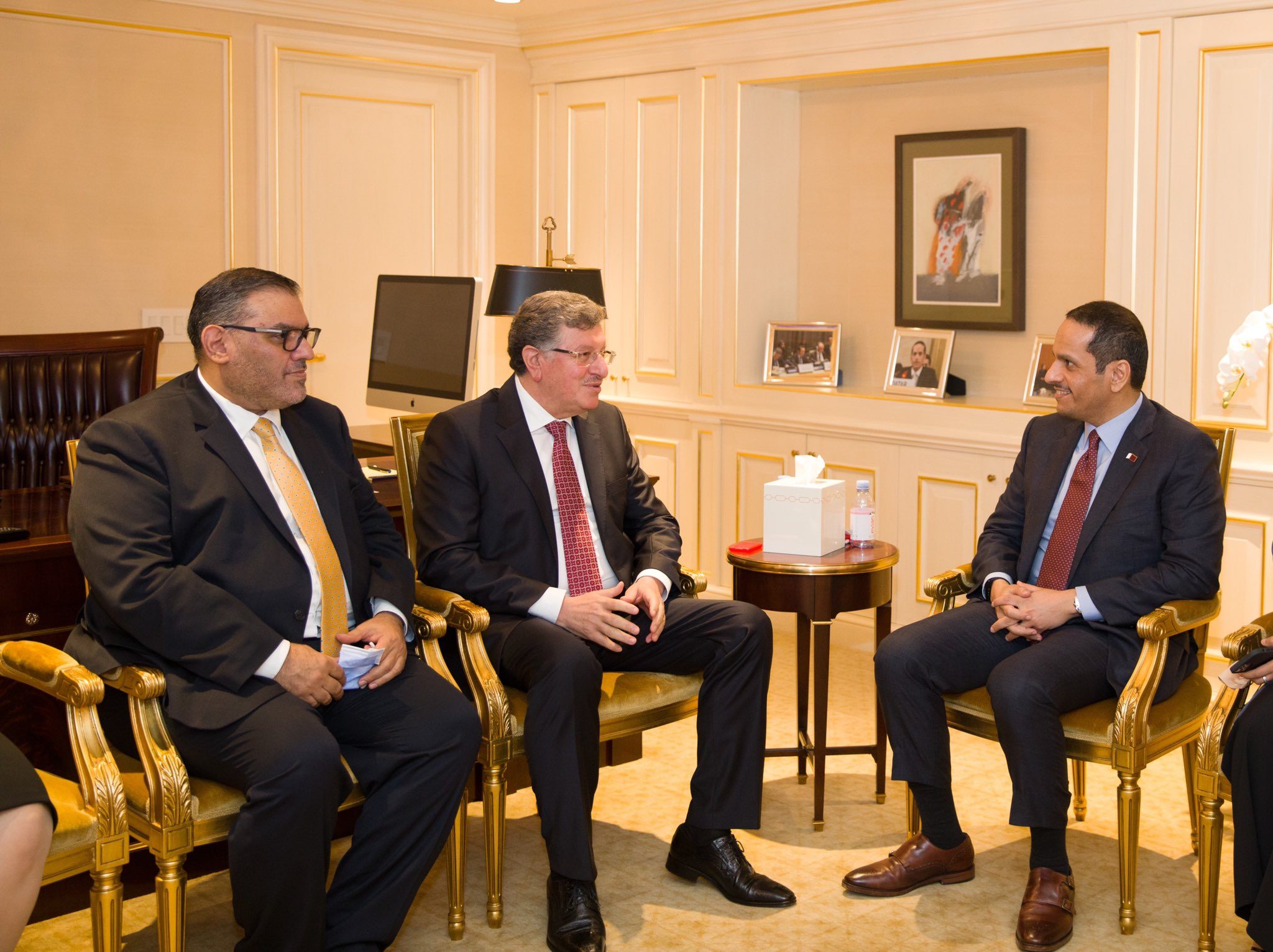Syria has faced a humanitarian and political crisis for more than a decade.
Qatar has once again reiterated the importance of resolving the ongoing crises in Syria through political means, urging for an urgent a ceasefire on Wednesday.
This came during a meeting between Qatar’s Minister of Foreign Affairs Sheikh Mohammed bin Abdulrahman Al-Thani and a delegation from the Syrian opposition on the sidelines of the 76th UN General Assembly [UNGA] in New York.
The delegation included Syria’s President of the National Coalition for Opposition and Revolutionary Forces Salem Al Meslet, and head of the opposition delegation to the UNGA, Anas Al Abda.
“[Sheikh Mohammed] reiterated Qatar’s position of having a political resolution to the Syrian Crisis in line with Geneva I statement and UN Security Council resolution 2254, and stressed the importance of reaching a comprehensive ceasefire that contributes to facilitating the delivery of aid inside Syria,” read a statement by the Gulf state’s foreign ministry.
The meeting took place following a powerful speech made by Qatar’s Amir Sheikh Tamim bin Hamad Al Thani at the assembly on Tuesday, in which he called on the international community to not abandon Syria.
“A decade has passed since the crisis in Syria, which began with a peaceful uprising and turned into a humanitarian catastrophe due to the war that the regime waged on its own people and the armed extremist powers that used the situation,” said Sheikh Tamim.
Since the re-election of President Bashar Al-Assad this year, Qatar has renewed its refusal to normalise with the regime as well as its rejection to allow Damascus’ re-entry into the Arab League.
“There may come a day when we remember this neglect of human suffering from injustice with great regret,” noted the Qatari leader, adding that the crisis can be resolved with the implementation of Security Council Resolution 2254.
Commenting on the latest brutal attacks in Daraa Al Balad in southwestern Syria, Qatar’s amir said it is “not permissible to neglect the Syrian issue nor should the international community turn its back on the suffering” of the people living under the ongoing crimes of the regime.
Afghanistan, Palestine and climate change: Qatar’s amir spotlights key issues at UNGA
Daraa was at the heart of the revolution in Syria and has been under a siege by the Al-Assad regime since late June this year, which has carried out a brutal bombardment in the Syrian city.
The bombardment went on despite the Russia-brokered ceasefire in September, as Syrian troops captured rebel-held parts of villages near the besieged city, where 50,000 civilians live and were forced to flee the area.
The UN said that a month of fighting led to the displacement of more than 38,000 people in July this year.
Unsafe for refugees
The UN Commission of Inquiry on Syria warned the country is not safe for refugees to return amid ongoing attacks by pro-government forces as well as an ongoing siege on a number of areas.
“The war on Syrian civilians continues, and it is difficult for them to find security or safe haven,” said head of the Commission of Inquiry, Paulo Pinheiro.
Earlier this month, Amnesty International said Syrian refugees who have returned home have been either tortured, detained or forcibly disappeared by security forces.
The Amnesty report titled “You’re going to your death”, detailed violations by intelligence officers against 66 refugees who returned home, including 13 children in addition to five deaths in custody.
The report was released as countries, such as Denmark, called on refugees to return to Syria.
“Any government claiming Syria is now safe is wilfully ignoring the horrific reality on the ground, leaving refugees once again fearing for their lives,” the report said.
A recent report by Save the Children on Thursday also warned that Syrian children stuck in refugee camps are “wasting away” amid violence and illness.
Titled “When am I going to start to live?”: The urgent need to repatriate foreign children trapped in Al Hol and Roj Camps”, the report found that 40,000 children living in camps in northeastern Syria continue to struggle to survive.
The NGO said that avoidable illness, deaths caused by fires, poor water and sanitation, and malnutrition are among the many factors contributing to the children’s worsening situation.
“Sixty-two children, or approximately two every week, have died of different causes in Al Hol so far this year” said Save the Children, adding that 73 people, including two children, have been murdered in Al Hol this year.
The children are also suffering from mental illnesses due to their traumatic experiences and only 40% of them are receiving education.
“It is more urgent than ever that foreign governments with nationals in Al Hol and Roj – many of whom fled their homes to escape ISIS – take responsibility and bring children and their families home, said the organisation,” read the report.
Syria is also facing a new surge in daily coronavirus infections, with government health authorities reporting 235 cases on Wednesday – the highest since March last year.
So far, the country has managed to administer 440,000 doses of Covid vaccines, which is not enough for the population of 18 million people.
“The occupancy of intensive care units [ICU] for Covid-19 patients have reached close to 100%,” said Issam Al-Amin, the head of Mouwasat University Hospital, one of the largest public hospitals in Damascus, with over 800 beds.
The country’s active cases has also exceeded 25,000, forcing schools and public market places to close on Tuesday.
Follow Doha News on Twitter, Instagram, Facebook and Youtube







